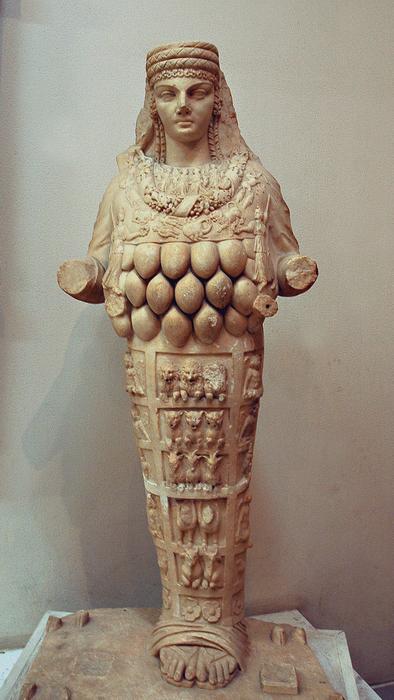 Ferguson. Baltimore. Dallas. Ephesus. Test: pick which one doesn’t belong. Ephesus? Nope. All belong. Ephesus didn’t make non-stop cable news and no one was killed; but it was another city riot.
Ferguson. Baltimore. Dallas. Ephesus. Test: pick which one doesn’t belong. Ephesus? Nope. All belong. Ephesus didn’t make non-stop cable news and no one was killed; but it was another city riot.
I included a short video and a few photos (two modern-day), for background information. Maybe overkill, but I find these cities interesting.


![]()
Paul spent more time in Ephesus than any other city. He was wildly successful. Not only the city, but ” . . . all the residents of Asia heard the word of the Lord” (Acts 19:10b).
Now after these things had been accomplished, Paul resolved in the Spirit to go through Macedonia and Achaia, and then to go on to Jerusalem. He said, “After I have gone there, I must also see Rome.” So he sent two of his helpers, Timothy and Erastus, to Macedonia, while he himself stayed for some time longer in Asia (Acts 19:21,22, NRSV).

Why go west to Macedonia when he wanted to go southeast to Jerusalem? To collect an offering from the Macedonia Gentile churches for the poor Jerusalem Christians (1 Corinthians 16:1-4). So, guided by the Holy Spirit, Paul made his plans. But he hadn’t counted on the riot.
About that time no little disturbance broke out concerning the Way. A man named Demetrius, a silversmith who made silver shrines of Artemis, brought no little business to the artisans. These (artisans) he gathered together, with the workers of the same trade, and said, “Men, you know that we get our wealth from this business. You also see and hear that not only in Ephesus but in almost the whole of Asia this Paul has persuaded and drawn away a considerable number of people by saying that gods made with hands are not gods. And there is danger not only that this trade of ours may come into disrepute but also that the temple of the great goddess Artemis will be scorned, and she will be deprived of her majesty that brought all Asia and the world to worship her.” When they heard this, they were enraged and shouted, “Great is Artemis of the Ephesians!” The city was filled with the confusion; and people rushed together to the theater, dragging with them Gaius and Aristarchus, Macedonians who were Paul’s travel companions (Acts 19:23-29, NRSV).
A little disturbance? Author Luke, euphemistically, calls it “a little disturbance”. Demetrius, pressing on the profit-loss, rounded up angry Artemis salesmen. Artemis was “the ancient mother goddess of Asia Minor, worshiped in that land from time immemorial as the mother of gods and men. Her temple at Ephesus was one of the seven wonders of the ancient world; her image, enshrined in that temple, was believed to be of heavenly workmanship: it appears to have been a meteorite in which the semblance of a many-breasted female was discerned. Her worship was marked by the traditional features of nature-worship; it was presided over by eunuch priests and three grades of priestesses. She had a special festival about the time of the spring equinox, at the beginning of the month Artemision: it may have been at the time of this festival in A.D. 55 that the trouble now described by Luke broke out” (The Book of Acts, F. F. Bruce).


Some of the crowd gave instructions to Alexander, whom the Jews had pushed forward. And Alexander motioned for silence and tried to make a defense before the people.But when they recognized that he was a Jew, for about two hours all of them shouted in unison, “Great is Artemis of the Ephesians!”But when the town clerk had quieted the crowd, he said, “Citizens of Ephesus, who is there that does not know that the city of the Ephesians is the temple keeper of the great Artemis and of the statue that fell from heaven? Since these things cannot be denied, you ought to be quiet and do nothing rash.You have brought these men here who are neither temple robbers nor blasphemers of our goddess. If therefore Demetrius and the artisans with him have a complaint against anyone, the courts are open, and there are proconsuls; let them bring charges there against one another. If there is anything further you want to know, it must be settled in the regular assembly. For we are in danger of being charged with rioting today, since there is no cause that we can give to justify this commotion.” When he had said this, he dismissed the assembly. After the uproar had ceased, Paul sent for the disciples; and after encouraging them and saying farewell, he left for Macedonia (Acts 19:33-20:1), NRSV).
* * * * *
” . . . the closer you are to the King and the more focused you are on the gospel, the more likely you are to draw the enemy’s fire.” So writes Reformed pastor and theologian Derek Thomas. But why does God allow us to suffer for the gospel?
Back in Philippi, Paul and Silas suffered prison apparently so the jailer and his family might be saved (Acts 16:25-40). But why did God send his servant smack into the middle of a city riot here? Writing later to the Corinthian church, Paul tells us . . .
We want to remind you, friends, of the trouble we had in the province of Asia. The burdens laid upon us were so great and so heavy that we gave up all hope of staying alive. We felt that the death sentence had been passed on us. But this happened so that we should rely, not on ourselves, but only on God, who raises the dead (2 Corinthians 1:8,9, GNT).
After a life time of studying the word and years of preaching and planting churches, Paul still had God-reliance lessons to learn. So do we. So do I. When we’re living for Jesus but life turns hopeless, when we feel condemned to a terrible fate, God is teaching us to rely on him alone. And to remember he is the God who raises the dead.



Recent Comments